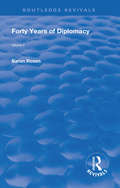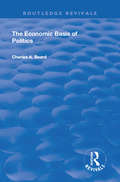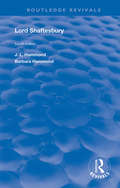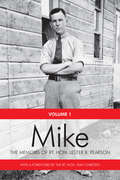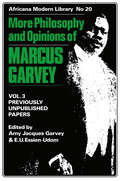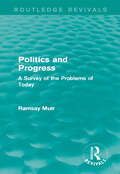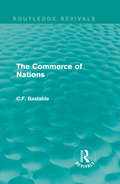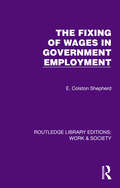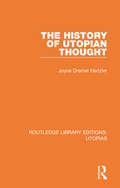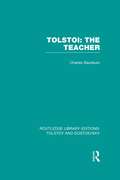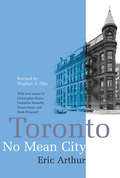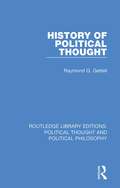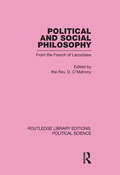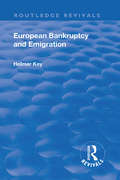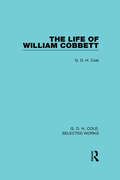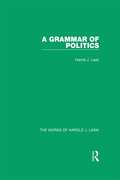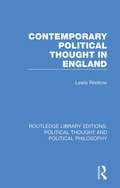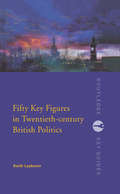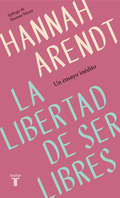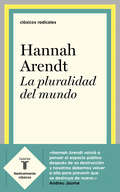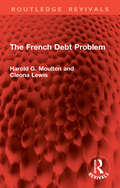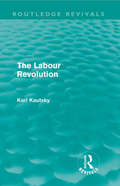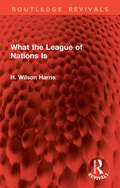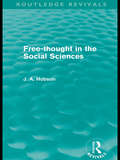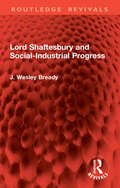- Table View
- List View
Revival: Volume II (Routledge Revivals)
by Roman, Baron RosenBaron Rosen recounts his experiences as a diplomat.
The Economic Basis of Politics (Routledge Revivals)
by Charles A. BeardOriginally published in 1922, this volume is composed of four lectures which the author gave at Amherst College in 1916 on the Clark Foundation. The founders of this lectureship desired to help carry forward the eternal quest of mankind for ways and means with which to control its social destiny for noble ends. This book includes chapters on the doctrines of the philosophers, economic groups and the strucutre of the state, and the doctrine of political equality.
Lord Shaftesbury (Routledge Revivals)
by Barbara Hammond J. L. HammondOriginally published in 1923, this book covers the career of Lord Shaftesbury from his early career, through Peel's government and factory legislation, and onto religion and philanthropy. His name recalls great achievements in the reform of law; a powerful force in debates and contests, on the issue of which depended the fortunes of England, and he helped to both create and destroy institutions, habits and beliefs to great consequence of his successors.
Mike
by Rt. Hon. Cretien Rt. Hon. PearsonOne of Canada's most dynamic prime ministers, Lester B. Pearson lived a life which took him from a childhood in rural Ontario to the apex of international politics. The first volume of his memoirs follows him from his youth as the son of a Methodist preacher to his decision to enter politics in 1948.In this volume of Mike, Pearson recalls his university years at the University of Toronto and St. John's College, Oxford, his military service in the First World War, and his return to the University of Toronto in 1923 to teach history and, in his spare time, coach football and hockey. In 1928, Pearson joined the Department of External Affairs, rapidly rising through the ranks to become ambassador to the United States by 1945.Mike captures Pearson's intellect, his sense of humour, and his humanity, offering a charming look at the youth of a great statesman. This new edition features a foreword by Pearson cabinet minister and former prime minister Jean Chrétien.
More Philosophy and Opinions of Marcus Garvey: Or, Africa For The Africans (New Marcus Garvey Library #No. 9)
by Amy Jacques GarveyFirst published in 2004. Routledge is an imprint of Taylor & Francis, an informa company.
Politics and Progress: A Survey of the Problems of Today (Routledge Revivals)
by Ramsay MuirIn Politics and Progress, Muir aims to outline the political and social aims of liberalism and how it differs from conservatism and socialism as well as philosophising what a truly liberal society would look like. Originally published in 1923, this study details the political situation as it stood then, the past achievements of liberalism and what immediate problems society is facing that need to solved. This title will be of interest to students of politics.
Routledge Revivals: The Commerce of Nations (1923)
by C.F. BastableFirst published in 1929, this book was written to express the belief that nations’ commercial policy and doctrines could best be explained by reference to their history. The author argues that this applies equally to legislation and theory, for example both the McKinley Act of 1890 and contemporaneous protectionism are examined as the culmination of a century’s worth of legislative and theoretical progress. This edition is also updated from the original 1891 publication to take account of the effect of the First World War on the European and American tariff systems, and also how the preferential system of trade within the British Empire recast relations between Britain and its dominions.
The Fixing of Wages in Government Employment (Routledge Library Editions: Work & Society)
by E. Colston ShepherdOriginally published in 1923, this thorough and critical volume collected and analysed material bearing on the UK Government practice during the early part of the 20th Century in settling wages in 4 key government departments. A substantial introduction indicates the constitutional aspect of the problem and its relation to economic theory on the subject of wages. The book discusses developments in Government wage negotiations and provides a comparison with methods of other countires. The changes of the First World War period are summarized in Chapter 5.
The History of Utopian Thought (Routledge Library Editions: Utopias)
by Joyce Oramel HertzlerThis book, originally published in 1923, embodies two related and yet distinct types of sociological endeavour. It is a study in the history of social thought, a field which had only been receiving serious and widespread attention in recent years, and attempts to give an historical cross-section of representative Utopian thought at the time. But it is also a study in social idealism, a study in the origin, selection and potency of those social ideas and ideals that occasional and usually exceptional men conceive, with particular emphasis upon their relation to social progress. It was the first book that attempted to give an unprejudiced, systematic treatment of the social Utopias as a whole.
Tolstoi: The Teacher (Routledge Library Editions: Tolstoy and Dostoevsky)
by Charles-BaudouinThe author states here that Tolstoy was a great educator and his views on education were ingenious and profound. Despite being a great artist, Tolstoy also had pedagogic method and drew abundantly on the stores of science. The book looks at articles which Tolstoy wrote on education and childhood, comparing him frequently to Rousseau, and also outlines the influences of his travels which informed his knowledge of contemporary schooling. The conclusion considers the development of Tolstoy’s thought on teaching alongside the state of education at the time the book was first published, in 1923. This will be of interest for the educational historian as well as those interested in Tolstoy himself.
Toronto, No Mean City
by Stephen Otto Eric ArthurEric Arthur fell in love with Toronto the first time he saw it. The year was 1923; he was twenty-five years old, newly arrived to teach architecture at the University of Toronto. For the next sixty years he dedicated himself to saving the great buildings of Toronto's past. Toronto, No Mean City sounded a clarion call in his crusade. First published in 1964, it sparked the preservation movement of the 1960s and 1970s and became its bible. This reprint of the third edition, prepared by Stephen Otto, updates Arthur's classic to include information and illustrations uncovered since the appearance of the first edition.Four new essays were commissioned for this reprint. Christopher Hume, architecture critic and urban affairs columnist for the Toronto Star, addresses the changes to the city since the appearance of the third edition in 1986. Architect and heritage preservation activist Catherine Nasmith assesses the current status of the city's heritage preservation movement. Susan Crean, a freelance writer in Toronto, explores Toronto's vibrant arts scene. Mark Kingwell, professor and cultural commentator, reflects on the development of professional and amateur sports in and around town.Readers will delight in these anecdotal accounts of the city's rich architectural heritage.
History of Political Thought (Routledge Library Editions: Political Thought and Political Philosophy #25)
by Raymond G. GettellFirst published in 1924. This extensive volume explores the history of political theory from Ancient Greece up until proletarian thought in the early twentieth century. The author pays particular attention to the connection between economic and political theory during the eighteenth and nineteenth centuries. History of Political Thought will be of great interest to students of history, politics, and philosophy.
Political and Social Philosophy (Routledge Library Editions: Political Science #30)
by D. O’MahonyThis volume consists of many of Lacordaire’s writings on social and political issues, many of which have been out of print for a long time and some of which appeared in this volume, when originally published, for the time in English. The central theme of the book is that the Christian solution of all the great social and political problems is liberal and democratic, Christian doctrine being based on the equality of souls. It argues that Christian fraternal charity is a stronger force than mere humanitarian brotherhood or political socialism.
Revival: European Bankruptcy and Emigration (Routledge Revivals)
by Carl Axel KeyThis book is the outcome of a series of articles which appeared in the "Svenska Dagbladet" in the summer of 1923 and were afterwards published as a book. The interest aroused in Sweden and the other Scandinavian countries, and still more the momentous problems it is concerned with, have induced me to revise and enlarge it for an English version in order to reach a wider public. Also, the great English-speaking community, possessing more experience of colonization than any other people, may safely be presumed to take a still more vivid interest in these question which involve in my judgement the future of the white race and of its civilization.
The Life of William Cobbett (Routledge Library Editions)
by G D ColeThis volume is representative of the historical works of a particular period (1923-29) when there was a hiatus in the output of Cole the theoretician. It is an extraordinary contribution to labour history and is among the finest of his historical works.
A Grammar of Politics (The Works of Harold J. Laski)
by Harold J. LaskiLaski’s magnum opus, this volume outlines the history and functions of state institutions which (in the author’s view) are desirable for the effective functioning of a democracy. Topics discussed include: The necessity of government; state and society; rights and power; liberty and equality; property as a theory of industrial organisation; the nature of nationalism; law as a source of authority; the functions of international organisations.
Contemporary Political Thought in England (Routledge Library Editions: Political Thought and Political Philosophy #50)
by Lewis RockowFirst published in 1925. This book is a brief analysis of the historical relation of contemporary writers to their immediate predecessors. The author attempts to further a comprehensive summary of certain selected writers, with a criticism of their ideas, while in the last chapter an attempt is made at synthesis. Among those whose work is examined are Ramsay MacDonald, Bertrand Russell, Harold Laski, the Pauls, Hobhouse, Bryce, G. D. H. Cole, Norman Angell, etc. This title will be of great interest to students of politics, philosophy and history.
Fifty Key Figures in Twentieth Century British Politics (Routledge Key Guides)
by Keith LaybornThis guidebook provides a complete overview of the lives and influence of fifty major figures in modern British political history. Reflecting the changes within British society and politics over the past century, the entries chart the development of key contemporary issues such as women's rights, immigration and the emergence of New Labour. Figures covered include:* Winston Churchill* Tony Blair* Emmeline Pankhurst* David Lloyd George* Margaret Thatcher* John Maynard Keynes* Enoch Powell* Barbara CastleWith cross-referenced entries and helpful suggestions for further reading, this book is an essential guide for all those with an interest in understanding the dominating issues of modern British politics.
La libertad de ser libres
by Hannah Arendt«Leer a Hannah Arendt permite comprender mejor el presente.» Berliner Morgenpost ¿Qué es la libertad y qué significa para nosotros? ¿Consiste solo en la ausencia de miedo y restricciones, o acaso implica también la participación en procesos sociales, con voz política propia, ser escuchado, reconocido y finalmente recordado por otros? Publicado en Estados Unidos en los años sesenta pero inédito hasta hoy en español -y en alemán-, este ensayo refleja el rigor y la fuerza del pensamiento político de Hannah Arendt y condensa con precisión y maestría sus reflexiones sobre la libertad, de gran calado y capaces de conectar de manera asombrosa con los desafíos y peligros de nuestro tiempo. Arendt rastrea el desarrollo histórico de la noción de libertad, en particular, toma en cuenta las revoluciones en Francia y América. Mientras que la primera supuso un punto de inflexión en la historia pero terminó en desastre, la otra fue un éxito triunfal pero se mantuvo como un asunto local. Repensar la idea de revolución se ha vuelto imperioso hoy, y este reencuentro con Hannah Arendt representa el impulso necesario para las nuevas generaciones. La crítica ha dicho:«Este ensayo recién redescubierto es como una petición de compromiso político en la era de Trump.»Die Zeit «Pese a haber sido escrito hace cincuenta años, es tan moderno que parece pensado para la actualidad política mundial.»Westdeutscher Rundfunk «Breve y revelador. Escrito hace más de cincuenta años, es de una vigencia pasmosa.»Deutschlandfunk Kultur «Una pieza muy atractiva y perdida por largo tiempo.»Süddeutsche Zeitung «Este texto tiene futuro hoy.»Frankfurter Rundschau «Un texto muy sugerente, que además es perfecto para los recién llegados a Arendt.»Zeitzeichen «Un ensayo inspirador de una relevancia extraordinaria, especialmente en tiempos en que se cuestionan los valores liberales del orden democrático.»Philosophie «Lo que parece un análisis preciso de la fallida construcción de la nación por medios militares, desde Somalia hasta Irak y Afganistán, en realidad tiene cinco décadas de antigüedad.»Westdeutsche Allgemeine Zeitung «Vale la pena leerlo por la claridad de su razonamiento, por ejemplo a la hora de fijar el concepto de "revolución" y reflejar su cambio histórico de significado.»Badische Neueste Nachrichten
La pluralidad del mundo
by Hannah ArendtLa obra de Hannah Arendt sintetizada en esta antología esencial e imprescindible. No hay nada más radical que un clásico. Hannah Arendt, la gran pensadora del siglo XX, es sin duda fundamental para afrontar los desafíos del XXI. Abordó todas las cuestiones clave de su tiempo, desde el antisemitismo hasta el totalitarismo, los orígenes de la democracia, la crisis de la autoridad, los fundamentos de la educación y la estética o el problema del mal en la modernidad. Toda su obra está sintetizada en esta antología esencial e imprescindible. ------------- radical: adj. Perteneciente o relativo a la raíz. «Clásicos Radicales» nace con la misión de recuperar algunos de los libros más emblemáticos del sello que en su día formularon una idea nueva u ofrecieron una mirada original y pertinente sobre las grandes cuestiones universales.Ausentes de las librerías durante demasiado tiempo pero recordados y buscados por los lectores más despiertos, estos textos esenciales de disciplinas como la filosofía, la ética, la historia, la sociología, la economía, la antropología, la psicología y la política mantienen su plena vigencia y vuelven hoy con fuerza para iluminar nuestro presente. ------------- Reseña:«Hannah Arendt volvió a pensar el espacio público después de su destrucción y nosotros debemos volver a ella para prevenir que se destruya de nuevo.»Andreu Jaume
The French Debt Problem (Routledge Revivals)
by Cleona Lewis Harold G. MoultonOriginally published in 1925, this volume was written at a time when the cost of living was rising in France and the currency of the Franc was declining. Uneasiness over possible national bankruptcy or financial disintegration was increasing. The book reveals the true financial situation in France and outlines a plan for the restoration of sound financial and economic conditions. As well as discussing the economy of post-World War I France the book also touches on the social and political problems of the time.
The Labour Revolution (Routledge Revivals)
by Karl KautskyFirst published in English in 1924 this ambitious work, by the famous Marxist theoretician Karl Kautsky, aims to provide nothing less than an "exposition of the methods to introduce socialism" amongst the capitalist economies of Europe in the post-World War One era. Looking back on the experiences of the German socialist movement and looking forwards to the likelihood of a Labour government in Great Britain, he discusses the problems facing a labour revolution in Europe, with particular reference to the role of the middle classes, the transitional period between capitalism and socialism, and the economic impact of a socialist revolution.
What the League of Nations Is (Routledge Revivals)
by H. Wilson HarrisOriginally published in 1925, written by someone who was associated with the work of the League of Nations from the beginning, this concise book is a clear and short account of the structure, function and tasks of the League of Nations at the start of the Twentieth Century. The necessary historical background to the political landscape at the end of World War 1 is provided and the early chapters deal with The Peace Conference and the Covenant as well as the signing of the Treaty. Later chapters examine the role of the International Labour Organization, the Court of International Justice, The Geneva Protocol, economic and financial organization and the restructuring of Europe.
Free-Thought in the Social Sciences (Routledge Revivals)
by J. A. HobsonThis Routledge Revival sees the reissue of a seminal work by British economist, sociologist and academic John A. Hobson, elucidating his views on a variety of topics across the social sciences. He makes particular reference to the struggle between the disinterested urge of the social scientist and the interests and other motive forces which tend to influence and mould his processes of inquiry. The work is split into three parts, focussing upon free-thinking, economics and political ethics respectively.
Lord Shaftesbury and Social-Industrial Progress (Routledge Revivals)
by J. Wesley BreadyOriginally published in 1926, this volume is much more than a biography of an outstanding politician, social reformer and philosopher. It provides an analysis of the history of social conditions in England during the nineteenth century, as well as a discussion of the development of social affairs and the inertia of political psychology. The role that faith and religion played in motivating Lord Shaftesbury’s desire for social reform is also discussed as is the ways in which he and John Wesley transformed the social and ethical ideas of England to enshrine in law many of the working conditions that we take for granted today such as defined hours of work and rest periods.
